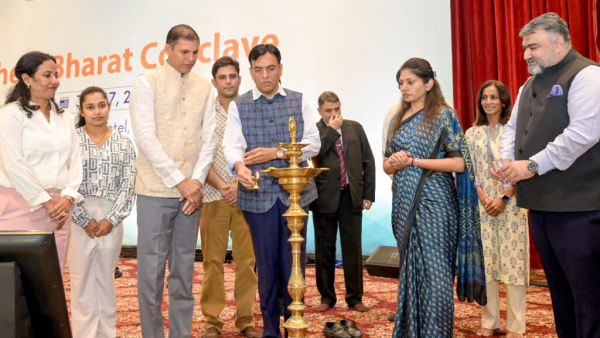
New Delhi: Performance-based funding and gene-testing of aspiring athletes to figure the best sport for them were among the suggestions before Sports Minister Mansukh Mandaviya sought a five-year plan from every national federation by the end of next month.
The inaugural one-day ‘Khelo Bharat Conclave’ had the top stakeholders of Indian sports under one roof for a good six hours during which ideas, both old and new, were discussed at length to chart the way forward. The ambition – make India a top five sporting nation by 2047 after elevating the country to the top 10 by the 2036 Olympics, which the country is ambitiously aiming to host.
“To begin with, I urge the NSFs to provide me a five-year policy by August and then we can develop a 10-year plan,” Mandaviya told the packed convention hall of a top hotel here.
“With the Asian Games in 2026, we need a holistic approach because we not only want to win medals at the Olympics but make sports a commercial property where we can invite the world to come and play in India and boost sports tourism in Ladakh and Jammu and Kashmir,” he said.
He reiterated the importance of resolving differences within National Sports Federations internally instead of involving global bodies and it is learnt that the NSF representatives present in the event did not counter that assertion.
Aside from the oft-repeated goals of winning up to 30 Olympic medals and improvement in sports governance, there were also some interesting suggestions from the participating delegates.
Indian Olympic Association vice president Gagan Narang, a former Olympic bronze medal-winning shooter, urged the ministry to work out a performance-linked funding mechanism.
“He felt there should be metrics that can help quantify where an NSF stands in terms of performance. According to him, any financial incentive should be linked to that performance assessment,” a ministry source told PTI.
Under-fire All India Football Federation chief Kalyan Chaubey, who is currently presiding over an alarming decline of the game, floated the idea of genetic testing for talent identification.
“Mr Chaubey felt that we should have this mechanism to understand what sport would work best for an aspiring athlete for optimum performance. It was an interesting suggestion,” said the source.
Gene-testing involves analysis of an athlete’s DNA to identify genetic variants that can affect muscle performance, endurance, cardiac performance and oxygen intake of the body. These markers can effectively help in finalising the ideal sport for a specific body type.
Former IOA secretary general Rajeev Mehta, meanwhile, urged the government to push for more Indian representation in international bodies like the Olympic Council of Asia and the International Olympic Committee.
While the OCA is currently led by an Indian — Randhir Singh –, Reliance Foundation’s Nita Ambani is an IOC member.
The corporate houses, a lot of them Public Sector Units, were urged to up their CSR funding for sports.
“Currently, it is one per cent of the total funds and the minister has called on them to raise it five per cent. Of course, the corporates wanted to know what would be their gain from the exercise.
“Unlike cricket, they don’t get any branding from their CSR spending in Olympic sports so yes, they have their concerns and would like to have ease of business, including some relief from complicated taxation,” the source said.
A three-layered integrated talent development structure, starting with schools and converging at the proposed Olympic Training Centres, was also discussed.
The government has already outlined a five-year plan (2026-27 to 2030-31) starting with residential sports school involving more than 16500 school-goers, who will have the opportunity to reach the intermediate level (6500-plus).
They will then graduate to the elite division that will cater to more than 1300 potential international medal-winners.
There was some complaining as well, it is reliably learnt. The Wrestling Federation of India is unhappy with the corporates’ role in their sport and reiterated that dissatisfaction in front of the minister.
“They are unhappy with the corporate interference. They conveyed to the minister that these corporates are not following plans created by WFI and appropriating the talent groomed by the federation. In their words, ‘they lure away our kids’,” the source said.
-
Is the spinal cord crooked? Know initial symptoms and prevention

-
Beneficial for health and beauty

-
‘Stalker’ declares love for groom in unhinged wedding speech

-
These are the ‘5 most dangerous islands’ in the world! Where death happens as soon as you step

-
White hair will be black in just 7 days, 99% people are unaware of this Ayurvedic remedy!
